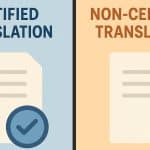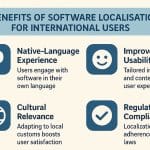In today’s interconnected world, businesses and individuals often need to communicate across languages and cultures. Whether it’s expanding a business into international markets, applying for immigration, or sharing important personal documents abroad, accurate translation plays a critical role in ensuring clarity and trust. This is where professional translation services become invaluable.
In this blog, we’ll explore why professional translation services are important, the types of documents commonly translated, the risks of poor translations, and how to choose the right translation partner for your needs.
The Importance of Accurate Translation
Translation is much more than converting words from one language to another. It involves conveying the correct meaning, tone, and cultural context of the original message. A single mistranslation can lead to confusion, legal issues, or even business losses. Professional translators have the training and experience to accurately interpret both the literal and implied meaning of the source text.
For businesses, a well-translated document or website can help build credibility in new markets. For individuals, accurate translation of personal documents ensures smooth processing in legal, academic, or immigration matters.
Common Documents That Require Professional Translation
Professional translation services cover a wide range of documents, tailored to meet the needs of businesses, government agencies, and individuals alike. Here are some of the most commonly requested translation services:
Legal Documents: Contracts, court orders, affidavits, wills, and legal agreements.
Immigration Documents: Birth certificates, marriage certificates, passports, and academic records.
Medical Records: Patient histories, prescriptions, and medical reports for treatment abroad.
Business Documents: Company profiles, business plans, brochures, and marketing materials.
Technical Manuals: Instruction manuals, safety guides, and engineering documents.
Academic Transcripts and Certificates: For students applying to foreign universities or for job opportunities overseas.
Website and App Translation: To reach a global audience effectively through digital platforms.
Risks of Inaccurate or Machine Translation
While free online translation tools have improved over the years, they still fall short when it comes to accuracy, especially for official documents. Machine translations often lack an understanding of nuance, cultural context, and industry-specific terminology. Relying on these tools for critical documents can result in:
Legal issues: Misinterpreted legal terms can invalidate contracts or cause disputes.
Financial losses: Poorly translated marketing materials can damage a company’s reputation or fail to connect with local customers.
Immigration delays: Incorrectly translated personal documents can lead to application rejections or delays.
Medical errors: Inaccurate medical translations can result in dangerous misunderstandings about a patient’s health condition or treatment.
This is why it’s crucial to rely on professional translators, who are not only fluent in the target language but also familiar with the cultural and technical nuances of the content.
How to Choose the Right Translation Service Provider
When selecting a translation service, it’s important to consider several factors to ensure you receive reliable, high-quality results. Here’s what to look for:
1. Certified Translators:
For legal, academic, and official documents, it’s essential to work with certified translators. Many government bodies and institutions require certified translations for document validation.
2. Industry Expertise:
Different industries have their own terminology and jargon. A translator experienced in your specific field — whether it’s legal, medical, or technical — can ensure accuracy and relevance.
3. Turnaround Time:
Timely delivery is important, especially when dealing with legal deadlines, immigration processes, or business launches. Choose a service that offers reasonable turnaround times without compromising on quality.
4. Data Privacy:
Ensure that the service provider follows strict confidentiality policies, especially when handling sensitive personal, legal, or business information.
5. Positive Reviews and Reputation:
Look for customer testimonials, reviews, and case studies. A well-established translation company with positive feedback is more likely to deliver reliable services.
The Benefits of Partnering with a Professional Translation Agency
Working with a professional translation agency offers several advantages over freelancers or automated tools:
Consistency and Accuracy: Agencies have teams of translators, editors, and proofreaders to ensure consistent quality.
Certified Translations: Agencies can provide notarized and certified translations required for official use.
Multilingual Support: Most agencies offer services in multiple languages, enabling you to manage diverse translation needs in one place.
Dedicated Customer Support: Professional agencies offer dedicated support teams to handle inquiries, revisions, and updates promptly.
Competitive Pricing: While agencies may cost more than free tools or casual freelancers, they offer value for money through reliable, high-quality services.







